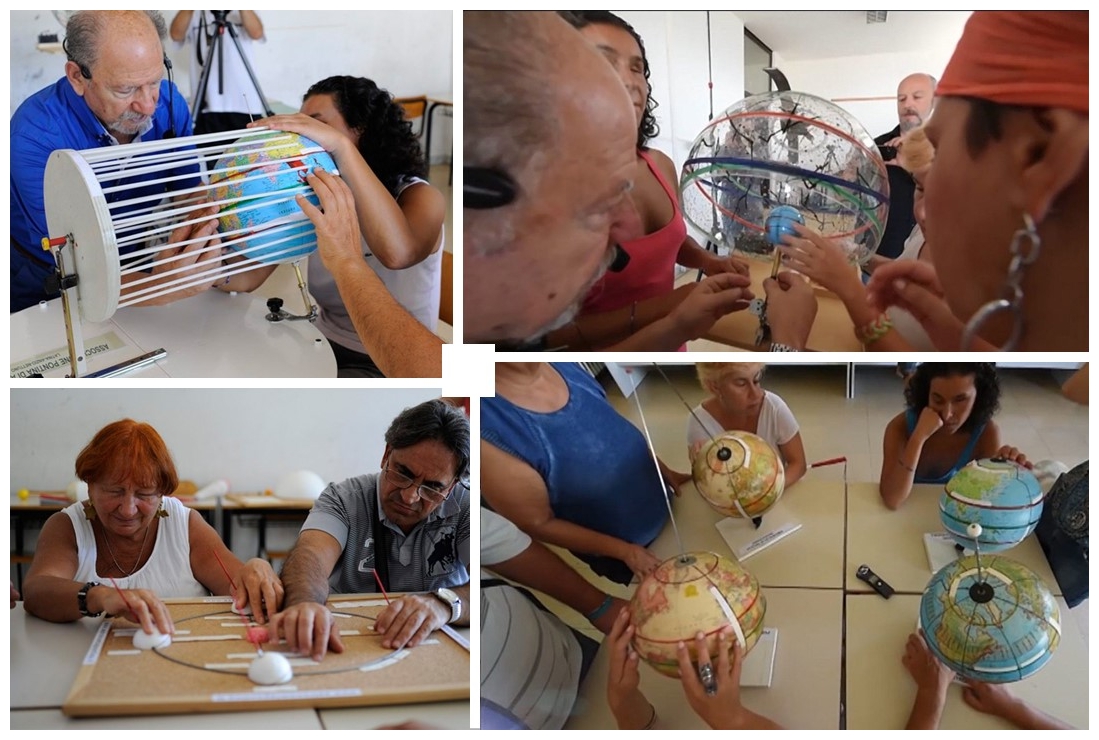
Blind people exploring tactile models of Earth’s motions and the seasons at an inclusive astronomy class
How do you explain the solar system, Earth motions, and the seasons to someone who has never seen a sunrise or a sunset? These are the challenges that some amateur and professional astronomers are undertaking, and this is their story.
Science is a key part of human culture, a key component of informed citizenship, and the basis for societal progress and a healthy democracy. Astronomy is perhaps the most universally fascinating science, and is often the “spark” that encourages people of all ages to become passionate about investigating how our world works; in other words, science.
Many astronomers, both amateur and professional, enjoy sharing their knowledge and passion with others, leading them to invest time in outreach activities: conferences, practical activities including sky observation with the naked eye or through telescopes, formal or informal classes, and many others. But these activities are not always designed to be accessible to people with disabilities; they are not inclusive.
Starting 2009, the “International Year of Astronomy”, some astronomers have focused on accessibility. The first inclusive programs launched that year to great feedback and enthusiasm from participants that has grown since then. An example is the amateur astronomy community in Italy, which now has 21 local associations participating in the National Program for Inclusive Outreach (“Stelle per Tutti” – Stars for all) project, with support from Unione Italiana Ciechi e Ipovedenti (Italian BVI union) and others (see www.uai.it/stellepertutti/ for details; in Italian).
Fast forward to 2020: the International Astronomical Union, focused on inclusion in general, created a special working group focused on increasing adoption of inclusive outreach practices worldwide. A description of the working group is available at iau-oao.nao.ac.jp/iau-inclusion/inclusive-outreach/. One approach the working group has adopted is to gather and share existing “good practices” and tools, and to foster the development of new ones. The working group has also created a community including outreach practitioners and the primary national and international associations of disabled people.
The working group has delivered a “starter kit” to facilitate the first steps into inclusion practices. The kit includes step-by-step instructions on building simple educational models and a set of good practices for arranging and performing inclusive activities. There is also a Facebook page and a group for the community. Materials and contacts are available at iau-oao.nao.ac.jp/iau-inclusion/inclusive-outreach-2/.
Experience has shown that cooperation with associations of disabled people is fundamental since they can provide expert feedback, specialized training, and connections to communities of blind and visually impaired people. The Inclusive Outreach working group is represented in several countries and can reach out to many others through the vast IAU network. We look forward to welcoming national association members of EBU who are interested in joining our community and contributing to the spread of inclusive practices in astronomy outreach activities. Please contact us through the link above.
Cesare Pagano - General Secretary of Unione Astrofili Italiani - Ccoordinator of IAU Inclusive Outreach (Inspiring Stars) subWorkgroup
Fabrizio Migliorini – Unione Astrofili Italiani Inclusive Outreach national program - IAU Inclusive Outreach (Inspiring Stars) subWorkgroup

